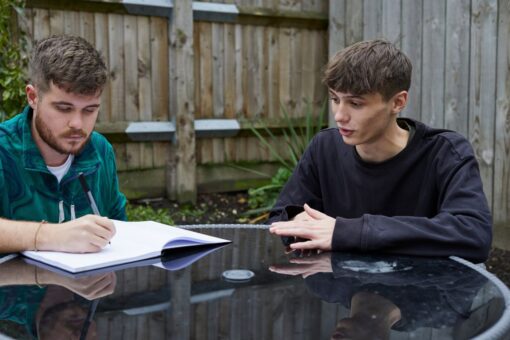Applications are now open to join the programme in summer 2025.
Changing narratives: Leadership – having confidence in your decisions

Sean Twomey is a registered social worker and team manager of the Emotional Health and well-being team at Cumberland and Westmoreland and Furness Children’s Services (previously Cumbria Children’s Services). He completed the Firstline programme in 2021-22.
Sean is an example of a deeply reflective and reflexive leader who is able to advocate for positive change gently and effectively.
Both the teaching and the coaching during the Firstline programme developed my confidence in owning the qualities of kindness and humility as a team leader and understanding their strengths.
Becoming a team manager at the start of lockdown in March 2020 brought its own unique challenges. Just before I started the Firstline programme, I came across a Danny Boyle speech where he defined courage as ‘grace under pressure’. That idea became a catalyst for me to start thinking about leadership differently. Adding to this were the principles that I took from the Firstline programme: that leadership is having the courage to follow and lead within your team; it’s having the humility to know that it’s not about you. When thinking about what it means to be a good leader, traits like humility and kindness seem less common. But I really liked how Jacinda Ardern, the previous New Zealand Prime Minister, talked about kindness as a leadership quality, adding a refreshing perspective to that definition. That framing helped me to approach being a team manager differently and embrace bringing my whole self into the role. Both the teaching and the coaching during the Firstline programme developed my confidence in owning the qualities of kindness and humility as a team leader and understanding their strengths.
Learning about self-advocacy helped me with setting boundaries in my role as a manager.
The coaching made an incredible impact when it really mattered. My coach, Bridget Knowles, supported me to develop my thinking about self-advocacy, informed by a recognition of what qualities I possess as an individual. As social workers, we typically aren’t very good at self-care and fighting for ourselves. Learning about self-advocacy helped me with setting boundaries in my role as a manager. In the past I felt responsible for how individual team members understood and responded to my messages differently. Through support from my coach, I was better able to recognise members of the team who reacted positively, whereas for the individuals who were struggling to keep up with the pace of changes being implemented, I chose not to performance manage them during the pandemic as that feel too unkind. Consequently, those three people eventually left my team under their own steam which created opportunity for new people to come in who are committed to what the team is about. That experience taught me to have confidence in making the right decision as a leader and allowing people to take responsibility in aligning themselves to the team and the organisation’s aims.
My personal experience enabled me to better understand and help him when others were struggling to.
Adding to this learning on advocacy were the rich conversations that my time at the residential was filled with. Specifically, there was a workshop about public narratives where the speakers shared their personal life stories which I found hugely moving. The facilitated break out discussions helped us to think about our own personal narrative, how it feeds into public narrative and why we came into social work in the first place. So, I connected that with my childhood experiences. At the time, I had picked up a case within my team working with a child who had similar issues as me when I was around his age which involved epilepsy. My personal experience enabled me to better understand and help him when others were struggling to. It enabled me to demonstrate that we could effectively support this child with special educational needs. I was able to help him and his family to undergo a process therapeutically that led to the child now having fewer seizures, no longer assaulting his parents and improving at school. I think that really proved how powerful it can be to connect your personal story to your professional life and has certainly helped me to advocate and affect change for children in our service.